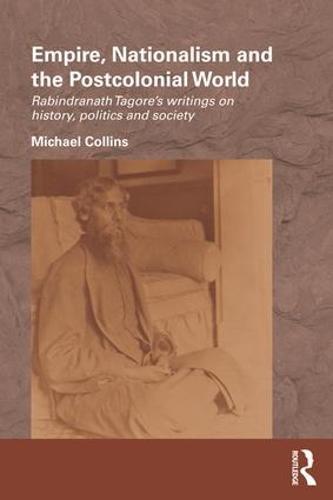Full Product Details
Author: Michael Collins ,
Tapan Raychaudhuri
Publisher: Taylor & Francis Ltd
Imprint: Routledge
Dimensions:
Width: 15.60cm
, Height: 1.20cm
, Length: 23.40cm
Weight: 0.453kg
ISBN: 9781138187054
ISBN 10: 1138187054
Pages: 232
Publication Date: 12 October 2015
Audience:
College/higher education
,
Tertiary & Higher Education
Format: Paperback
Publisher's Status: Active
Availability: In Print

This item will be ordered in for you from one of our suppliers. Upon receipt, we will promptly dispatch it out to you. For in store availability, please contact us.
Reviews
Rabindranath Tagore remains one of India's greatest thinkers. Michael Collins' book brilliantly sets him in the context of his European contemporaries, indicating how he was both interpreted and mis-interpreted for the wider world. - Sir Christopher Bayly, University of Cambridge, UK Michael Collins' fine research on the Indian poet and thinker Rabindranath Tagore sheds intriguing new light on the making of his reputation in the West. The book casts the intimate history of understanding and (as often) misunderstanding between Tagore and some of his closest supporters into poignant relief, and reminds us of the powerful and revelatory effects of close historical investigation. - Elleke Boehmer, University of Oxford, UK Works of scholarship can spread ripples, and I foresee a considerable ripple effect from Dr Collins' painstaking pursuit of unity amidst the often baffling contradictions of Tagore's discursive writings William Radice, SOAS; Frontline, Volume 28 - Issue 27 : Dec. 31, 2011-Jan. 13, 2012
Rabindranath Tagore remains one of India's greatest thinkers. Michael Collins' book brilliantly sets him in the context of his European contemporaries, indicating how he was both interpreted and mis-interpreted for the wider world. - Sir Christopher Bayly, University of Cambridge, UK Michael Collins' fine research on the Indian poet and thinker Rabindranath Tagore sheds intriguing new light on the making of his reputation in the West. The book casts the intimate history of understanding and (as often) misunderstanding between Tagore and some of his closest supporters into poignant relief, and reminds us of the powerful and revelatory effects of close historical investigation. - Elleke Boehmer, University of Oxford, UK Works of scholarship can spread ripples, and I foresee a considerable ripple effect from Dr Collins' painstaking pursuit of unity amidst the often baffling contradictions of Tagore's discursive writings William Radice, SOAS; Frontline, Volume 28 - Issue 27 : Dec. 31, 2011-Jan. 13, 2012
"""Rabindranath Tagore remains one of India's greatest thinkers. Michael Collins' book brilliantly sets him in the context of his European contemporaries, indicating how he was both interpreted and mis-interpreted for the wider world."" - Sir Christopher Bayly, University of Cambridge, UK ""Michael Collins' fine research on the Indian poet and thinker Rabindranath Tagore sheds intriguing new light on the making of his reputation in the West. The book casts the intimate history of understanding and (as often) misunderstanding between Tagore and some of his closest supporters into poignant relief, and reminds us of the powerful and revelatory effects of close historical investigation."" - Elleke Boehmer, University of Oxford, UK ""Works of scholarship can spread ripples, and I foresee a considerable ripple effect from Dr Collins' painstaking pursuit of unity amidst the often baffling contradictions of Tagore's discursive writings"" William Radice, SOAS; Frontline, Volume 28 - Issue 27 : Dec. 31, 2011-Jan. 13, 2012"
Rabindranath Tagore remains one of India's greatest thinkers. Michael Collins' book brilliantly sets him in the context of his European contemporaries, indicating how he was both interpreted and mis-interpreted for the wider world. - Sir Christopher Bayly, University of Cambridge, UK Michael Collins' fine research on the Indian poet and thinker Rabindranath Tagore sheds intriguing new light on the making of his reputation in the West. The book casts the intimate history of understanding and (as often) misunderstanding between Tagore and some of his closest supporters into poignant relief, and reminds us of the powerful and revelatory effects of close historical investigation. - Elleke Boehmer, University of Oxford, UK Works of scholarship can spread ripples, and I foresee a considerable ripple effect from Dr Collins' painstaking pursuit of unity amidst the often baffling contradictions of Tagore's discursive writings William Radice, SOAS; Frontline, Volume 28 - Issue 27 : Dec. 31, 2011-Jan. 13, 2012
Author Information
Michael Collins is Lecturer in the Department of History at University College London (UCL), UK. He specialises in Modern British and World History and the intellectual history of empire and decolonisation. http://www.ucl.ac.uk/history/about_us/academic_staff/dr_michael



